
MEd Capstone Projects 2024-2025: Higher Education Specialism
MEd Capstone Projects 2024-2025: Higher Education Specialism
Upcoming seminar
The future of Australian higher education and the Australian Universities Accord
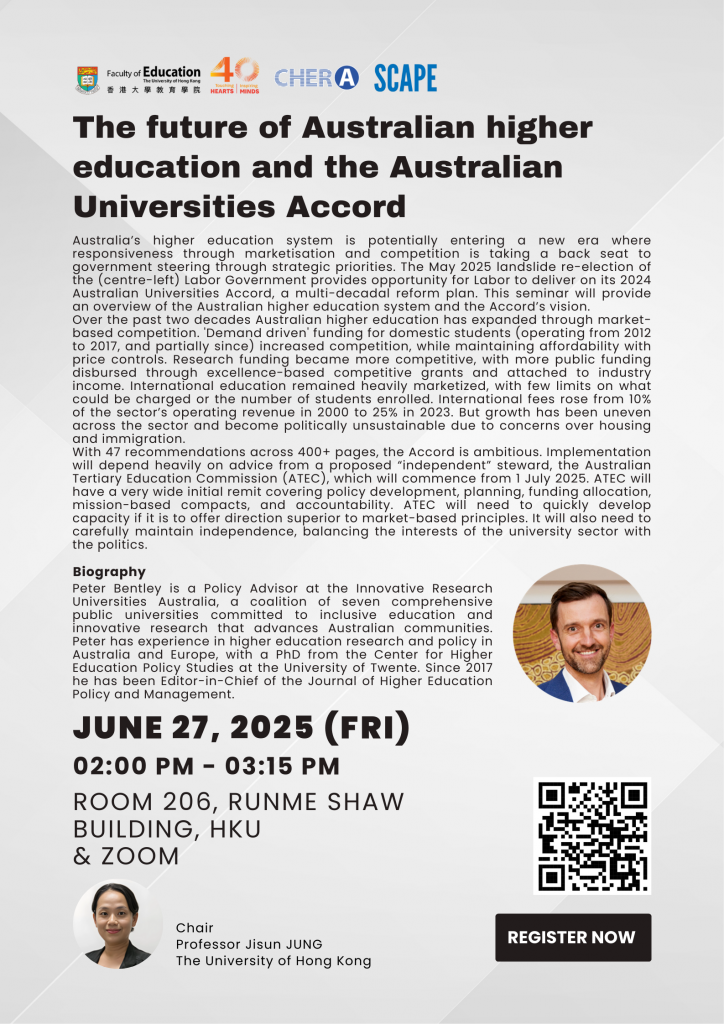
The future of Australian higher education and the Australian Universities Accord
Time: 2:00 to 3:15 pm, Friday, June 27
Format: Hybrid
Venue: RMS 206
Speaker: Dr. Peter Bentley (Innovative Research Universities Australia)
Chair: Prof. Jisun Jung (The University of Hong Kong)
Registration link: https://hku.au1.qualtrics.com/jfe/form/SV_eloVo7D7PP51CMC
Abstract:
Australia’s higher education system is potentially entering a new era where responsiveness through marketisation and competition is taking a back seat to government steering through strategic priorities. The May 2025 landslide re-election of the (centre-left) Labor Government provides opportunity for Labor to deliver on its 2024 Australian Universities Accord, a multi-decadal reform plan for tertiary education. This seminar will provide an overview of the Australian higher education system and the Accord’s vision, including the shift away from market-based principles.
Over the past two decades Australian higher education has expanded dramatically through market-based competition. ‘Demand driven’ funding for domestic students (operating from 2012 to 2017, and partially since) increased competition for domestic students, while maintaining affordability with price controls and accountability through a national regulator (TEQSA) and metrics-based reporting. Research funding also became more competitive, with more public funding disbursed through excellence-based competitive grants and formulaic funding attached to industry income. International education remained heavily marketized, with few limits on what could be charged or the number enrolled. International student fees rose from 10% of the sector’s operating revenue in 2000 to around 25% in 2023. But its growth has been uneven across the sector and proven unstable for universities and their staff. It has also become politically unsustainable due to concerns over housing and immigration.
With 47 recommendations across 400+ pages, the Accord is ambitious. But so far, its recommendations have been mostly unfunded or ignored by the Australian Government. Implementation will depend heavily on advice from a proposed “independent” steward, the Australian Tertiary Education Commission (ATEC). ATEC will commence from 1 July 2025 and have a very wide initial remit covering “policy development for higher education and research, future planning, making mission-based compacts, pricing, funding allocation, accountability, data collection and transparency, quality and performance.” ATEC will need to quickly develop capacity to offer advice and direction superior to market-based principles. It will also need to carefully maintain its independence, balancing the interests of the university sector with the politics.
About the speaker:
Peter Bentley is a Policy Advisor at the Innovative Research Universities Australia, a coalition of seven comprehensive public universities committed to inclusive education and innovative research that advances Australian communities. Peter has experience in higher education research and policy in Australia and Europe, with a PhD from the Center for Higher Education Policy Studies at the University of Twente. Since 2017 he has been Editor-in-Chief of the Journal of Higher Education Policy and Management.
Asia Holds Most of Global Private Higher Education Enrolment: How Is Asia Typical and Atypical Globally?
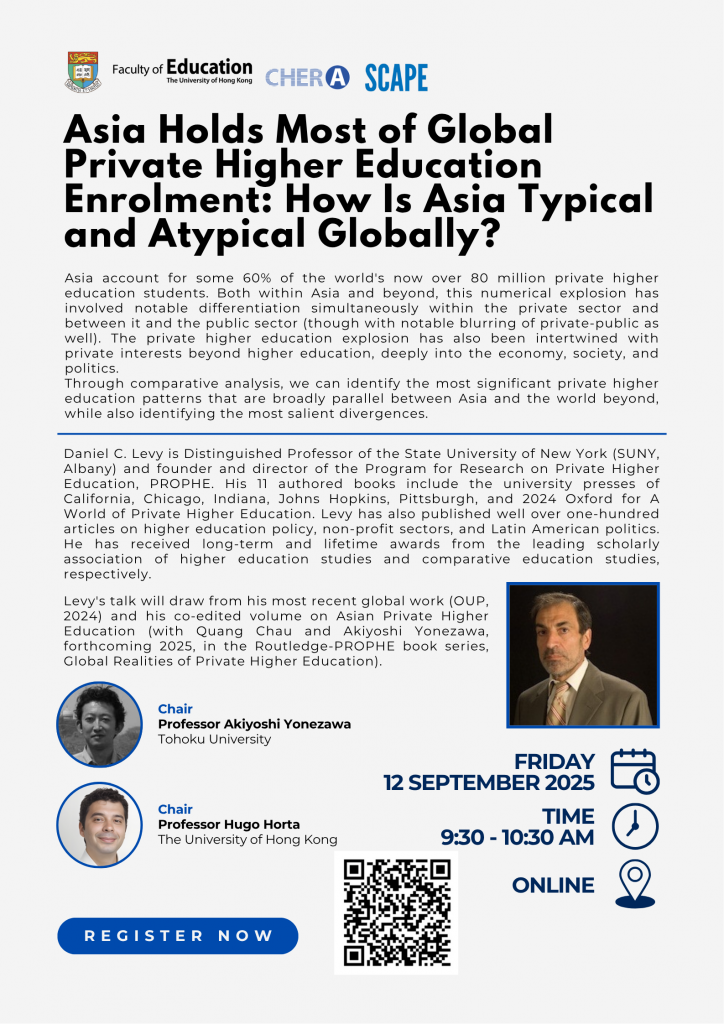
Time: 9:30am (HKT)
Date: Sep 12, 2025
Mode: by ZOOM
Speaker: Professor Daniel C. Levy (State University of New York)
Chair: Professor HORTA, Hugo (The University of Hong Kong); Professor Yonezawa (Tohoku University)
Registration link: https://hku.zoom.us/meeting/register/fUrqdy8YSB6YPvLGPfqlFg
ABSTRACT: Asia account for some 60% of the world’s now over 80 million private higher education students. Both within Asia and beyond, this numerical explosion has involved notable differentiation simultaneously within the private sector and between it and the public sector (though with notable blurring of private-public as well). The private higher education explosion has also been intertwined with private interests beyond higher education, deeply into the economy, society, and politics.
Through comparative analysis, we can identify the most significant private higher education patterns that are broadly parallel between Asia and the world beyond, while also identifying the most salient divergences.
BIO: Daniel C. Levy is Distinguished Professor of the State University of New York (SUNY, Albany) and founder and director of the Program for Research on Private Higher Education, PROPHE. His 11 authored books include the university presses of California, Chicago, Indiana, Johns Hopkins, Pittsburgh, and 2024 Oxford for A World of Private Higher Education. Levy has also published well over one-hundred articles on higher education policy, non-profit sectors, and Latin American politics. He has received long-term and lifetime awards from the leading scholarly association of higher education studies and comparative education studies, respectively.
Levy’s talk will draw from his most recent global work (OUP, 2024) and his co-edited volume on Asian Private Higher Education (with Quang Chau and Akiyoshi Yonezawa, forthcoming 2025, in the Routledge-PROPHE book series, Global Realities of Private Higher Education).
香港大學世紀之問 —— 改革開放初期與內地交流的人和事
HKU in the Early Days of Reform and Opening-up

| 《香港大學世紀之問 —— 改革開放初期與內地交流的人和事》 HKU in the Early Days of Reform and Opening-up |
| 主編:陳婉瑩 Editor-in-chief: Ying Chan 出版:三聯書店(香港)有限公司 Publisher: Joint Publishing (H.K.) Co., Ltd. |
| This book tells the story of 18 individuals who pioneered academic and professional exchanges between HKU and mainland China in the 1980’s. These men and women blazed the trail in eight sectors, medicine, engineering, literature and history, education, architecture, social work, law, and city planning, with expertise and dedication. Our CHERA members, Professors Gerard A. Postiglione and Cheng Kai Ming, actively engaged in exchange and communication with the mainland during the Reform and Opening-up period. They are prominently featured in the book with documents, stories, analysis, and photos. |
Jamil Salmi (ed.) (2023). Transforming Lives at the Institutional Level: Equity Promotion Initiatives Across the World
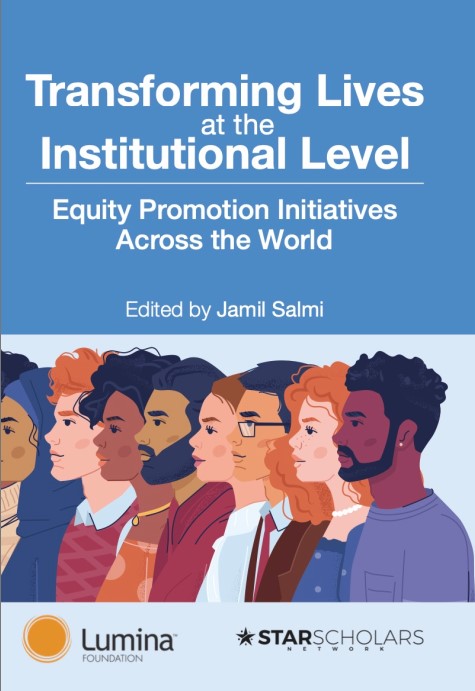
In the ever-evolving landscape of global education, the quest for equitable access to quality higher education remains a pressing challenge. Across the world, countless children and young individuals confront daunting circumstances that impede their educational opportunities due to factors such as race, gender, socioeconomic background, and geographical origin. This particularly affects those in developing countries and marginalized groups globally. To address this issue, promoting inclusivity and pluralism within higher education institutions has become an imperative driven by the principles of social justice and the United Nations’ Sustainable Development Goals.
Throughout Transforming Lives at the Institutional Level: Equity Promotion Initiatives Across the World, readers will gain profound insights into various equity-focused initiatives. From integrating low-income students into university cultures and implementing student aid programs to promoting balanced regional selection and supporting students with disabilities, the case studies offer a wealth of knowledge and good practices. They delve into affirmative action, indigenous inclusion, coaching programs, and many more initiatives aimed at improving access for underrepresented groups. This volume underscores the importance of comprehensive equity promotion policies that encompass financial and nonmonetary aspects. It emphasizes the need for coordination between national and institutional actions, with an equal focus on both access and completion. Long-term perspectives and well-established information systems are essential in effectively addressing equity gaps and measuring progress.
Editor
Jamil Salmi, Global Tertiary Education Expert, Emeritus Professor of Higher Education Policy at Diego Portales University, Chile
Gerard A. Postiglione, Christopher J. Johnstone, & Wesley R. Teter (eds.) (2023). HANDBOOK OF EDUCATION POLICY A New Direction for EU Foreign Policy?
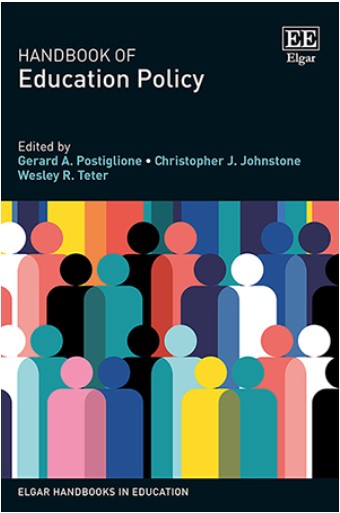
Edited by Gerard A. Postiglione (Professor Emeritus, Honorary Professor, The University of Hong Kong), Christopher J. Johnstone (Associate Professor, University of Minnesota, US) and Wesley R. Teter (Research Fellow, Center for Advanced School Education and Evidence Based Research, University of Tokyo, Japan)
Publisher: Edward Elgar Publishing
‘The new Handbook of Education Policy edited by Postiglione, Johnstone and Teter is a welcome addition to the academic literature on the transformation of education policy in the aftermath of the COVID-19 pandemic. The 22 chapters of this well-researched book give a comprehensive analysis of how education policy must adapt to a radically changed world. Through a skilful combination of thematic pieces and case studies from a large range of countries, the chapter authors challenge us to embrace new education policy concepts, such as public value governance and knowledge democratization, that can foster innovation and accountability in times of uncertainty. Gerard Postiglione, Christopher Johnstone, and Wesley Teter should be congratulated for this excellent scholarly contribution that has the potential of influencing policy makers all over the world to design and implement more sustainable and innovative education policies.’
– Jamil Salmi, Diego Portales University, Chile
‘This Handbook combines an up-to-date overview with theoretically-informed analysis of global education policies. It is erudite, insightful and original. It will be a vital resource for education policy researchers and an excellent starting point for students, in any location.’
– Stephen Ball, University College London, UK
This insightful Handbook is an essential guide to educational policy around the world. As shifting geopolitics, intensified climate change, and widening economic inequalities persist, the need for informed educational policy is critical.
Bringing together a unique collection of international case studies by scholars and practitioners from over twenty countries, the Handbook highlights how the contextual nature of educational policy and its implementation acknowledges both global trends and local nuance. Chapters explore key contemporary topics including the effects of the COVID-19 pandemic on international educational policy; opportunities for academic modernization in Ukrainian society; gender equality in Korean and Japanese universities; and inclusive education policies throughout the developing world, including India, South Africa, and Uruguay. It further discusses the ways in which governmental, non-governmental, and global education specialists are shaping new agendas focused on equity and responding to global crises.
Offering new perspectives on educational policy in a post-pandemic world, this comprehensive Handbook will be crucial reading for students and scholars of education policy, politics and public policy, sociology, and university management. It will also be beneficial for educational research associations and international development agencies, including UNESCO, the Asian Development Bank, and the World Bank.
Click here to access further details about the book.
Book review: Below is the book review for the “Handbook of Education Policy.” You can click on the image to view the full book review or simply click here to explore the book review in more detail.
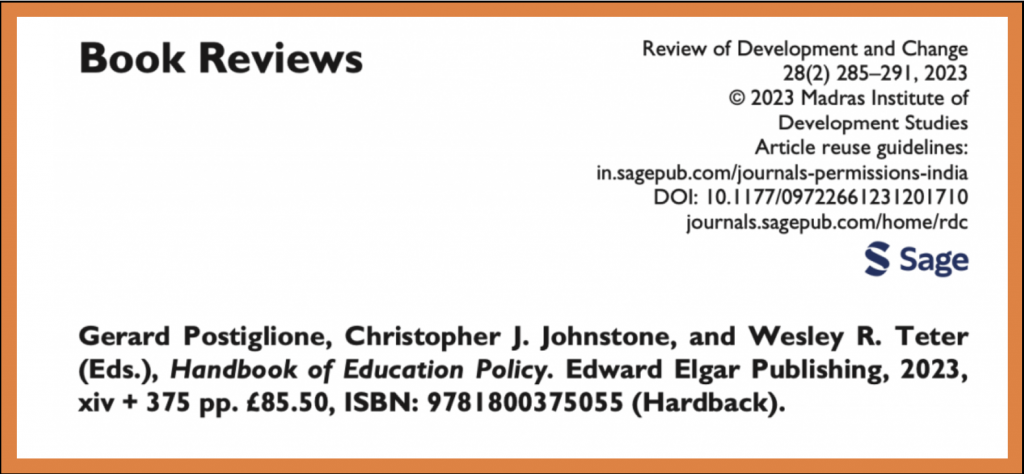
Tilak, J. B. (2023). Book review: Gerard Postiglione, Christopher J. Johnstone, and Wesley R. Teter (Eds.), Handbook of Education Policy
